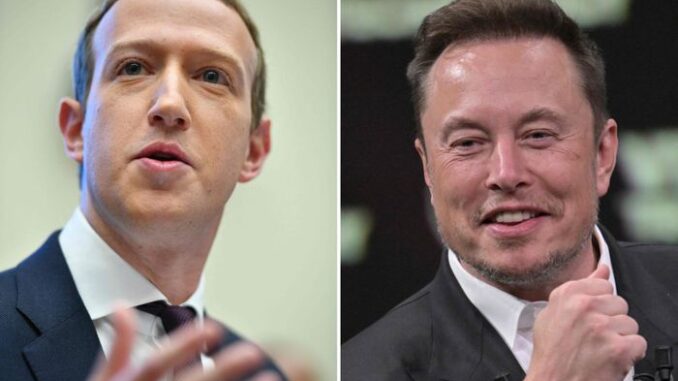The secret target of Facebook’s Twitter clone may well be Elon’s personal finances.
By Holman W. Jenkins, Jr., WSJ

Mark Zuckerberg and Elon Musk PHOTO: /GETTY IMAGES
Thug Mark Z. rolled up on thug Elon M. in a contest for an especially unlucrative corner in their version of the crack wars, and the question is why?
Elon is, of course, Elon Musk, who bought Twitter last year. Mark Zuckerberg is the Facebook guy, who did not strain his company’s budget to roll out a copycat service resembling Twitter last week. Even so, why bother? Twitter has made virtually no money in its entire existence. It’s a giant fiscal sinkhole right now. This is the action Mr. Zuckerberg hungers for a piece of?
Mr. Musk himself made clear: The only business argument for owning Twitter is the prospect of building some entirely new business on Twitter’s user base and infrastructure (he has talked about a super-duper financial app).
All along, he emphasized a non-business motive for purchasing the company. He was seeking to protect its role as a global “town square” from the undue partisan influence and progressive censorship that had flourished under previous management.
Mr. Zuckerberg hasn’t said anything similar but you might cheer for him anyway for one reason: His other businesses can support his Twitter replacement and its genuine speech-empowering function even if it doesn’t make money. Mr. Musk, in contrast, seems persistently in danger of having to raid his personal pockets to keep Twitter afloat unless he can bring back the advertisers he chased away or somehow create new revenue, neither of which he has managed to do in any conspicuous measure.
Messrs. Zuckerberg and Musk have talked of scheduling a physical “cage match” between them (which we pray won’t happen). But they are already in a financial cage match and it’s personal because of the fix Mr. Musk has created for his private finances.
Unbelievably, some see an antitrust problem because Mr. Zuckerberg is recapitulating his habit of cloning or copying rival services that were succeeding in the social-media marketplace. This riles up people like Federal Trade Commission Chairwoman Lina Khan, but it can’t be the function of antitrust to protect dominant players like Twitter from competition.
That said, Mr. Zuckerberg may have a particularly ruthless, predatory kind of competition in mind. Twitter’s main survival risk these days may well be Mr. Musk’s willingness to pump more money into it. The company has shed three quarters of its workforce. It’s been reduced to stiffing vendors and creditors on their bills. Mr. Zuckerberg isn’t helping. Indeed, his real motive may be to compound the uncertainty to keep advertisers from returning to Mr. Musk’s platform.
Let’s roll back the clock. Forcing an unwilling Mr. Musk to overpay for Twitter was one of the more interesting experiments our courts have conducted in recent years. Twitter’s then-shareholders who took the money and ran can say it worked out well. In every other way, obliging Mr. Musk to complete the purchase, which involved loading up the cash-strapped company with billions in debt, endangered a useful if not profitable piece of global infrastructure.
Recall that Mr. Musk had to be sued into completing his Twitter purchase. On the 11th day of his ownership this column was warning about a possible bankruptcy. It would not be insane even now for Mr. Musk, whose hands are full with Tesla and SpaceX, to write off his $26 billion personal stake and walk away. He lost and gained twice as much in the last year on the fluctuations in Tesla’s share price alone.
Twitter represents an interesting wrinkle in Metcalfe’s law, which states that the value of a network is determined by the number of its users. Twitter’s millions of users have potential value to advertisers or as an audience paying for innovations if Mr. Musk can come up with any. They have little value to each other. Most have nothing to offer but witless, formulaic and derivative attitudinizing. Twitter’s true redeeming value, as far as I can see, lies in a handful of thinkers and experts who voluntarily share their knowledge and wisdom on the world’s important continuing stories.
Covid was the story that originally had me making more time in my day for Twitter. The Ukraine war lately is another. If Twitter ceased to be an efficient and attractive way for these people to share their thoughts, it would be a loss to the world even if 99.9% of the traffic on the platform consists of people being jerks to each other.
So far, happily, it’s not happening, despite the Elon turmoil, despite the emergence of “Threads” by Mr. Zuckerberg, who doesn’t appear really to understand Twitter’s true utility. But neither is it obvious how Twitter can pay the bills it needs to pay in order to remain useful to its most socially valuable tweeters and their audiences. Somehow, a happy ending doesn’t seem in the cards.
Appeared in the July 15, 2023, print edition as ‘The Musk-Zuckerberg Cage Match Has Begun’.



This doesn’t make sense to me:
Jenkins puts Zuck and Musk in the same boat: They both have to prop up their “Twitters” with funds from their other ventures. Why, then, does he say
“in contrast”.
BTW Vivarto, interesting question.
The logical answer from Musk should be to make a copy Facebook, and call it Freebook.
The difference will be that there is no censorship and no data collection. That will kill Facebook.